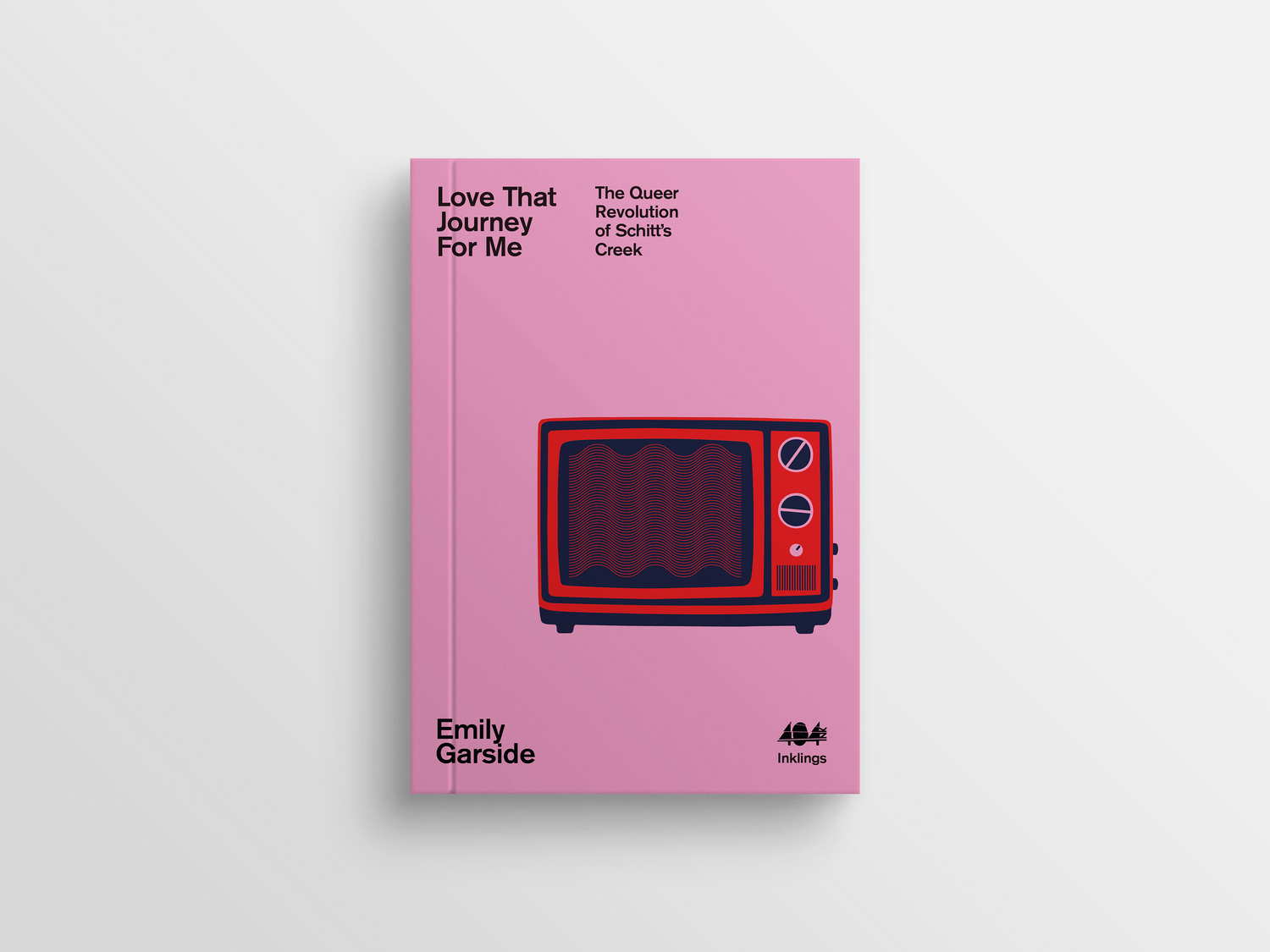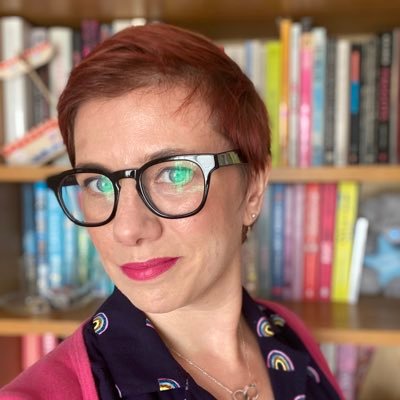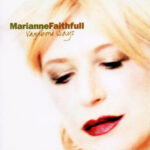A few months ago I was scrolling lazily through Insta, when my friend’s attendance at a book reading caught my attention. Not because my friend was someone unlikely to attend a book reading, but because of the book itself: Love That Journey for Me: The Queer Revolution of Schitt’s Creek. The title was there, undeniable, and incredibly provocative. A quick search proved hugely rewarding as I quickly found that the brains behind this beautiful little pink volume (I mean look at that shelf appeal)

was a fascinating, Cardiff-based academic and playwright called Emily Garside. I connected with Garside’s brand of academia instantly and was spellbound as she approached her reading of Schitt’s Creek in the same meticulous way I have interpreted cultural texts similarly dear to me. She writes: “The reason for writing this book was twofold: to embrace sentimentality and to embrace extreme nerdiness.” Yasss! Thank you!
For the three people who are unfamiliar, Schitt’s Creek is a hugely popular, yet simultaneously quaint Canadian sitcom created by father and son, Eugene and Dan Levy (Eugene Levy being that Eugene Levy of American Pie ‘Dad’ fame and having two left feet and ‘everybody loving terriers’ in Best in Show). It centres on a wealthy family, fallen from grace, forced to relocate to their one remaining asset, a town called Schitt’s Creek. Through many comedic mishaps they eventually find their place and happiness there. What makes the environment Dan Levy creates in Schitt’s Creek so compelling is the town is a utopia that is seemingly accepting of eccentricity, as seen in our favourite diva, the mother Moira (Catherine O’Hara) and, most poignantly and relevant to Garside’s book, a town free of homophobia as several key characters explore their sexuality freely. The key love story everyone focuses on of course being that between David and Patrick. Garside supposes that Schitt’s Creek possesses a unique place in the development of the TV sitcom and in queer narratives. She writes how that previous to Schitt’s Creek:
“Stories about homophobia, along with other forms of prejudice, have been needed to right the wrongs of previous TV and film narratives, whether deliberately homophobic or because it was culturally acceptable, covertly or overtly. Storylines challenging that have been a vital part of queer visibility, but perhaps the next evolution on that journey is to start imagining what stories might be told if we simply take homophobia out of the equation.”
That evolution is what Schitt’s Creek provides. A world where sexual expression can be performed safely and where we can, as viewers, see ourselves reflected in these characters very honestly free of discrimination. It is possibly why, Garside says, it is so beloved:
“The ‘Happy Ending’ of the show is of the kind we all need sometimes. Though each of us can feel lost at certain points in life, as both David and Patrick do themselves at times in the show, the promise that sometimes it does work out, that we can all find our ‘town without prejudice’, is cheering.”
Her book, published by 404 Ink was unsurprisingly a hit, with the first pressing selling out in a week.
Previous to Love That Journey for Me, Garside’s career has stayed true to exploring LGBTQ+ representations in popular culture. She is a playwright, theatre academic and writer. Her phD centred on the fascinating space of theatrical responses to the AIDS crisis and she is at the moment working on realising that thesis as a book; Longing for What’s Left Behind and Dreaming Ahead: Angels in America. Angels in America, by Tony Kushner is of course a play that most of us know from the 2003 multi award winning HBO adaptation starring Al Pacino and Meryl Streep. It was a breathtaking realisation of a hugely complex work; a study of homosexuality, religion, America in the 1980’s and AIDS. Her next book will be on Jonathan Larson’s musical Rent, with both titles due out later this year. Garside’s voice is so enjoyable to read – whether it be in a book or a personal essay – as she masterfully pulls multiple threads, ideas and cultural texts together.
This year, International Women’s Day is promoting the motto of #BreakTheBias. A hashtag I feel fits in perfectly with the work Garside does. I was lucky enough for her to take some time with us for an interview and talk more about issues of gender equality.
You can find out more, read more of her work and of course buy her book here:
https://linktr.ee/emilygarside
https://twitter.com/emigarside
The Interview
PB: First things first, it’s crucial we get this out of the way, the important stuff… Schitt’s Creek, in 10 years time, how do you think they’re all doing?
EG: So, ‘Mom and Dad’ are hopefully retired now. Moira obviously still takes the odd bit of work, because try stopping ‘TV’s Moira Rose’ but she persuaded Johnny to step down, and properly retire. I’d like to think they move back, closer to Schitt’s Creek again, not in the town necessarily, but maybe nearby in a big but tasteful house this time.
I think Johnny hands over the company to Stevie, who I think might leave the town at some point. Even just temporarily. Roland wouldn’t want control, and over 10 years Stevie would become more and more Johnny’s right hand woman. In my ideal reading Stevie is the queer woman she always should have been, but I figure either way she finds a partner, but they’re likely fairly unconventional in their approach.
Roland proves he’s actually pretty smart, and becomes an asset to the business. Does he shave the mullet off though? I really hope not.
Alexis continues to climb the career ladder- being more like her mom than she ever knew- and is successful. I don’t think she’s settled down, but she’s happily single, has genuine friends. But also spends a lot of her free time travelling to see her parents and brother.
David and Patrick? I think maybe they stay a while then move on too. Passing on management of the Store to someone (maybe one of Stevie’s more capable cousins?!) the business grows, maybe they expand into other things. Patrick starts coaching Little League and channels all his competitive energy into that. David has creative projects- maybe art? Maybe clothes? Both of them are unofficial ‘queer mentors’ to younger kids, and that’s how they have kids in their lives.
I like to think wherever Mom and Dad end up retiring, the kids, including Stevie (maybe even Roland) end up nearby too.
PB: What does International Women’s Day mean to you, specifically, as a queer woman?
EG: I think for me the intersectionality is important. I think it’s a reminder to raise my voice for myself and for others. I worry sometimes at being labelled an ‘angry feminist’ but I also look at all the work still to do and think you know what, time to carry on.
PB: This year’s hashtag is #BreakTheBias. What does this mean to you?
EG: I thought for a while about this, and I think I was thinking too ‘big’ what it actually means to me is walking into a space and not being pre-judged for my gender. I’m chair of a board of trustees, and have been for five years. That’s young to be a chair, but what’s also something I’m hyper aware of is my gender and being seen as a ‘young woman’ in that role. I walk into meetings and despite my position, I’m judged by older men. I want to break the bias so that my gender doesn’t play into that equation.
As a queer woman too, I want to break the bias around what a queer woman looks like. Whether it’s ‘too queer’ or ‘not queer enough’ I don’t want to have to prove my identity by how I look. I don’t want to have to break down barriers within our already marginalised community. And I want this to extend to trans women in our community. Nobody should have to prove they belong.
PB: I hate having to talk about safety for women, safe spaces etc. I feel like it makes us small, as it shouldn’t be our concern, but instead the concern of those who need to learn to respect us, but I know only recently you have had issues with trolling online for publishing a new essay about asexuality in Schitt’s Creek. What is your advice for coping with these attacks mentally and emotionally? Where do you see this culture of abuse going? Can it get better?
EG: I think it’s a sad reflection of the work still to do. I often think too that rarely does a straight cis white man worry about his safety when sharing work online, but women often do. Personally I’m lucky I’ve never felt threatened in my personal safety. But this week wasn’t the first time nor will it be the last. I think too the emotional fallout is more than the trolls consider (or maybe they do) because your work is tied to your personal life and your sense of self, especially if you’re writing on women’s issues or queer issues.
That said, I remind myself that in the scheme of things, I’ve done hopefully more good. That the people who hate what I do or hate me (at least vocally!) are a minority. This week I weighed up that my article had several people say ‘this made me consider my sexuality’ or ‘this educated me’ or even just ‘I enjoyed reading this’ and they far outnumber in worth a handful of people who hate me. I also try to remember it says more about another person that they go out of their way to spread negativity, than it does about me. It’s not easy, and I’d also like to say that I shed a number of tears this week. I think it’s important to acknowledge that, because ‘just rise above’ or ‘just ignore them’ doesn’t acknowledge the emotional impact.
In terms of getting better, I think we’re better at recognising it. I think too as communities – be they women, or queer folks, we’re good at rallying and protecting our own. That community is important in public and in private. But we do need tighter rules for the more extreme ends.
PB: How has coming out as asexual been important for you and how do you feel this is an important step for others out there that you write so eloquently about it?
EG: Thank you for saying it’s eloquent! I think it was a harder ‘coming out’ process in that if people see you as one thing for a while it’s harder to say your’re not. It was also the first time I was conscious of ‘coming out’. That said once I told my mum, I felt I was able to be publicly as ‘out’ as I wanted to be.
I think I will encounter more negativity being out as Ace as it’s just less understood than other sexualities. But that’s also why it’s important to be visible. I was able to understand my asexuality from people like Cody Daigle-Orians (AceDadAdvice) and like them, as an ‘elder’ in the community, I feel like it’s both an honour and responsibility to be visible for other people. I also really enjoy engaging with people, educating people and when they’re receptive it’s the best feeling. I also feel so strongly that if you can influence just one person’s life for the better with something you write you’ve done your job. I might have got some hate for my article on Patrick Brewer and demisexuality, but more than one person told me it either validated their experience or even more importantly maybe made them think about their own sexuality. That’s huge, to think I was part of either educating someone about an identity they didn’t know about so they will be more inclusive, or I helped someone on their own journey. I think if I have even a tiny bit of skill for that I should use it.
https://www.tiktok.com/@acedadadvice/video/7072361676527488299?is_from_webapp=1&sender_device=pc&web_id7053878954024830469
PB: What drew you to studying the AIDs crisis representation? And why was Angels in America so academically compelling for you? What were the first cultural moments you remember of the AIDS crisis being a thing to you as a child?
EG: So I stumbled upon Angels in America when the DVD version of the HBO series came out. I watched it and something clicked. I fell in love with Kushner’s writing. That series was an odd sort of comfort to me in a strange time (Living abroad, my dad had just died) and I still find a lot of comfort in particular in part one of that series.
Later I needed a play to write my MA dissertation on and there was a national tour of Angels, and I got a chance to dive deeper again into it. For me the combination of history, politics and theatre that Kushner weaves was exactly the thing I loved (I’d done a history undergrad degree).
Given I also had found Rent at a similar time and that the first Broadway show I saw a few years earlier was The Boy From Oz (the true story of Peter Allen, singer-songwriter who died of AIDS) somehow something was pushing me towards these stories. I became fascinated by how as a community theatre used what it had to tell the story of a history nobody was talking about at the time. I was also fascinated by how we use art, theatre, to express what can’t perhaps be expressed elsewhere. That also theatre is part of how we tell our history.
I grew up as a child of section 28 and while I was aware of AIDS we didn’t talk about it in school other than to scare us into not getting it (how, when we didn’t talk about being gay?) I remember my father making comments like ‘oh well I suppose they all got it from blood transfusions did they’. I think I was drawn to it, because I’d been denied an education. Still I’m finding out things about that time, about queer history that I never knew. I think too of it as righting some wrongs, making sure that history is passed on.
PB: How did Angels lead to further academic work with Rent and Jonathan Larson?
EG: I discovered Rent around the same time as Angels (within a few months of each other actually) as any musical theatre teenager it was a rite of passage (at least across the 90s and 00s) I fell in love with the music but also the story Larson was telling. A few months later I was lucky enough to see it on Broadway (twice in one week actually) and I had the most powerful moment I’d had in theatre to that point…and still one of the most powerful moments I’ve ever experienced in a theatre. It’s a sort of ineffable thing, falling in love with Rent and everyone who knows that feeling.
For me too, as a nerd of musical theatre and what makes it tick, Rent is an endlessly fascinating chapter to analyse. It also, in a way that’s hard to describe for anyone who wasn’t there, shaped how musical theatre fans engaged with theatre. We followed that cast and subsequent ones from show to show, and those experiences shaped us, made us the theatre nerds we are.
The show itself occupies a special place in my heart, as a somewhat lost 19 year old, trying to find my identity, having just lost a parent…the idea of community, being who you were, finding a family outside family…all of it perfectly aligned with what I needed. I always say you find Rent at the time you need it.
PB: Considering your next book is on Andrew Larson and Rent, I am curious to ask you about your response to the new version of Larson’s autobiographical musical tick tick…BOOM! starring Andrew Garfield and directed by Lin-Manuel Miranda. Larson declares in the film, ‘I’m the future of musical theatre’, something that the writer apparently said. Could it be argued Lin-Manuel Miranda, the film’s director, is both our present and our future?
Larson did indeed say that! (on several occasions) and hey he was right. I think Miranda is a great spokesperson for musical theatre, but that musical theatre is a community. There’s so many brilliant composers, artists and creators out there. I love that he’s using his profile for good and I just hope he also directs people to the up-and-coming composers. I love the through line from Sondheim, to Larson to Miranda and talk about it often when I’m teaching musicals. But I also ask, ok then who is next? I think Larson would have been excited by that question too!
I have such an interesting relationship with Miranda. I saw In the Heights on Broadway back in the day when he was still in it (because I’m old). I love his legacy through Larson too, and he feels like a way to still connect with Larson, and also now sadly Sondheim too. Is Miranda the single-handed answer to ‘the future of musical theatre’ ….no because nobody is. But in opening it up to so many different audiences that’s the important thing.
PB: A Final very geeky question from me, bringing it back to Schitt’s Creek and Love That Journey for Me. You mention Gilmore Girls in passing in your book because of its troubled relationship with queerness, but, I am forever so conflicted by writer/creator Amy Sherman-Palladino – she broke huge barriers with her writing of LGBTQ+ storylines on Roseanne, wanted Sookie to be gay on GG and in the GG Netflix revival finally put the world to rights and place Michel in a happy gay relationship. But. The reason I bring it up is the town she created. It is so similar to Schitt’s Creek, right? she is an idealist in a way similar to how you describe Levy. Her motive may not be as deeply personally driven, but could you argue Stars Hollow in Gilmore Girls is a failed utopia that you could argue Levy succeeds at?
I love this idea- I came to GG late but I adore much of the world that is created there. I think it’s important to remember too it’s obviously ‘of its time’ in many of the things we cringe at now. I’m fascinated too by my own fascination with small-town America. It’s my worst nightmare in real life but my TV genre of choice.
I think too we are very quick to judge the media of the recent past- things move so fast in terms of inclusivity which is great, but actually that means things date faster. We should remember that they’re all part of progress.
PB: What are your current cultural recommendations?
EG: TV
The Bold Type
This is Us
Kim’s Conveience
Albums (I’m going to do female-led ones)
Phoebe Bridgers – Stranger In the Alps
Kacey Musgraves – Star Crossed
Taylor Swift– Red (Taylor’s Version)
Sarah McLachlan – Mirrorball Live
Sarah Harmer – All of Our Names
Cast Recordings:
Waitress
Six
Legally Blonde
Smash
Company (2017 revival)
Books:
Upside Down by NR Walker was fundamental in my asexuality journey. So was The Charm Offensive by Alison Cochrun (both are charming romcoms too) You can’t go wrong with any of Rainbow Rowell’s books.
100 Women For 100 Years (not just because I’m in it!)




